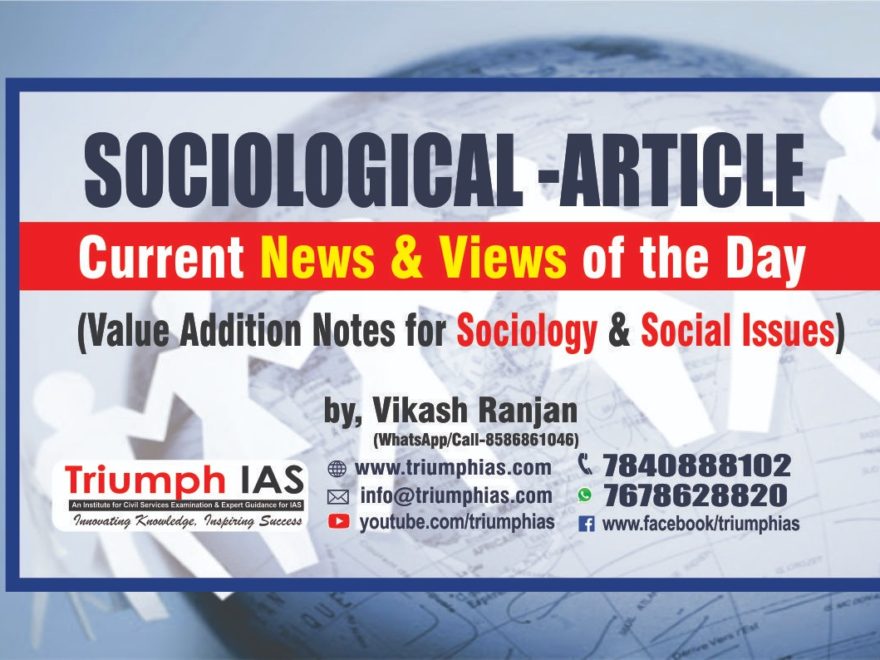Poverty and Animal conflict
Relevance: Sociology: Challenges of Social Transformation:
(a) Crisis of development: displacement, environmental problems and sustainability.
(b) Poverty, deprivation and inequalities.

Human-wildlife conflict is a monumental issue for farmers living in subsistence, conflict with wild animals disproportionately impacts the poor.
Poverty and Illegal Wildlife Hunting

Poverty is often perceived as the root cause of illegal wildlife hunting because poor people hunt illegally to satisfy basic material needs.
For example, a study of Bwindi National Park in Uganda showed that those arrested for unauthorized activities in the national park were significantly poorer and more likely to live closer to the national park and farther from trading centers than others.
A recent study on the links between poverty and wildlife crime in Uganda indicated that one of the most effective ways to reduce illegal wildlife hunting is poverty alleviation. Similarly, more effective involvement of the rural poor in both development and conservation projects is also advocated.
However, poverty is a complex condition, which makes these claims opaque. What form of poverty and poverty alleviation are referred to?
Challender and MacMillan note, poverty is not a singular category, and they draw attention to the importance of relative poverty in driving illegal wildlife hunting. However, we go a step further to argue that a much more sophisticated analysis of what constitutes poverty, relative poverty, and inequality are needed to develop a better understanding of what the ultimate drivers of illegal wildlife hunting are. We could not review debates on poverty in much detail, but it is important to explain the relevance of engaging with the meaning of poverty.
Within debates about conservation there has been a tendency to rely on largely economic definitions of poverty that focus on material deprivation. For example, in a systematic review of evidence of the links between poverty and biodiversity, 70% of published papers that addressed poverty as part of conservation used income as the key measure .
It follows logically that illegal wildlife hunting can supposedly be tackled via provision of paid employment (e.g., as rangers and tour guides), which increases levels of material wealth, or alternative income generation or disbursement schemes, such as development of markets for local agricultural produce or funds from selling safari hunts and photographic tourism.
Based on this logic. suggest that because illegal resource use in Kibale National Park, Uganda, is not driven by food insecurity, then the approach of enforcing exclusion of local communities is justified.
The argument that people hunt illegally because they are materially poor is repeated in powerful policy arenas. For example, the International Conservation Caucus Foundation (ICCF), which involves one‐third of the membership of the U.S. Congress, has stated that extreme poverty in Africa is the source of illegal wildlife hunting as well as radicalization.
The same view was expressed in the high‐level meeting on illegal wildlife trade hosted by the U.K. Government in May 2013. We do not dispute the argument that material deprivation matters, but there are 3 problems with defining poverty only in material terms.
First, the understanding of poverty is itself impoverished; it does not capture what being poor means. Following Sen’s (1999) formulation, poverty also encompasses a lack of power, prestige, voice, and an inability to define one’s future and day‐to‐day activities, which are difficult to measure in quantifiable terms.
Second, it denies that the poor have agency and are able to lead fulfilling and meaningful lives. Accordingly, illegal wildlife hunting may not simply be a way of averting want and deprivation, it may be a means of seeking and affirming identity, status, lifeways, custom, and local prestige.
A current challenge for conservation is how to measure human well‐being and multidimensional poverty in order to capture factors such as voice, prestige, and status (Sen 1999). It is critical to develop an understanding of how such factors relate to behaviors, such as illegal wildlife hunting, so that they can be integrated into conservation measures.
MacDonald’s (2005) work on the Himalayan ibex trophy hunting scheme in northern Pakistan underlines the importance of this perspective (2005). Aiming to conserve a declining ibex population, the IUCN worked to establish a trophy‐hunting scheme that required local people to refrain from hunting, an activity they had engaged in for centuries and sold hunting permits to international hunters.
The proceeds from the sale of permits were split between local people and the national government. However, the scheme failed to halt local ibex hunting, largely because hunting was a source of prestige and status. Distributing money from trophy hunts created new sources of prestige.
It did not remove all the incentives to hunt because those controlling the money were different from those who previously controlled the meat.
Third, defining poverty purely in economic terms allows it to be presented as a technical issue that can be solved through the provision of alternative sources of income. This in turn lends itself to technical interventions that are limited to economic incentives (e.g., alternative livelihood schemes) and disincentives (e.g., enforcement to make wildlife hunting illegal).
But a broader approach to understanding poverty (such as Sen’s analysis), would see interventions aimed at reducing illegal wildlife hunting embedded or mainstreamed into wider development initiatives that address the factors that drive the development of illegal wildlife hunting in the first place
For more such notes, Articles, News & Views Join our Telegram Channel.
https://t.me/triumphias
Click the link below to see the details about the UPSC –Civils courses offered by Triumph IAS. https://triumphias.com/pages-all-courses.php

